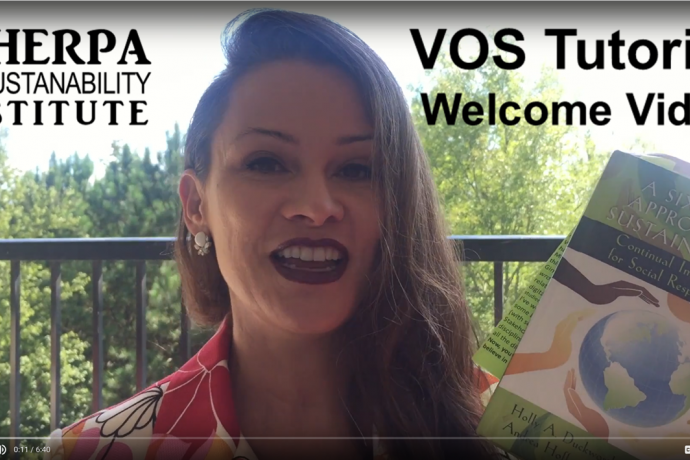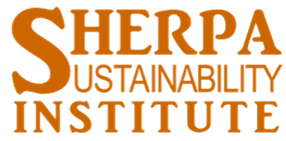Social Media for Successful Stakeholder Engagement: B-Corp Launches Free Online Tutorial Series - How to Drive Dialogue in Turbulent Times
SHERPA Sustainability Institute Shares How to Untangle a Knotted Mess of Engaging Stakeholders with Conflicting Interests
Published 09-23-16
Submitted by Sherpa Sustainability Institute
 Click to view video
Click to view videoSHERPA Sustainability Institute has launched a complimentary online Tutorial Series, focused on Social Media for Stakeholder Engagement. Special attention is given to engaging when there might be tension amongst individuals or groups.
Co-Founder, Andrea Hoffmeier explains, “As a B-Corp, we measure our success, not just by profit, but also by our contribution to society. We live in turbulent times. Violence, protests and civil unrest, not to mention a heated political environment, are all becoming our new normal. In the face of conflicting interests, Stakeholder Engagement can be a knotted mess. When organizations seek to engage with Stakeholders with whom there is tension, care must be taken in planning.
Hoffmeier also shares that she and her co-author, Dr. Holly Duckworth have been very busy this year, presenting the methodology introduced in their newly published textbook, “A Six Sigma Approach to Sustainability”, which details tools for successful Stakeholder Engagement. “We’ve presented at over 10 events this year, from coast to coast, and organizational leaders tell us they have many stakeholders, who often have conflicting points of view and concerns. Dr. Duckworth, whose Ph.D. is in Organizational Psychology, advises leaders to be prepared to face the risks of engaging with stakeholders with grievances, and to plan what corrective actions the organization will or will not be willing to take.”
The textbook outlines and demonstrates the meaning of CISR - Continual Improvement for Social Responsibility. Hoffmeier explains, “CISR® (sounds like scissor) is a rigorous method for improving social responsibility performance, similar to Six Sigma being a method for improving quality. But the goal is not simply the completion of an ongoing series of projects…”
The goal of CISR® is to achieve a CULTURE of Responsibility.
“The method starts with developing an understanding of our Stakeholders, and preparing to engage with them in dialogue. We’re often asked what we mean by Stakeholders. This refers to anyone, or anything, that can be helped or harmed by our actions. We also want to consider those who can help or harm us. In this age of societal tension, the potential for harm is a real concern. For professionals in Marketing, Product Development, Quality, and many other roles, we are shifting from Voice of the Customer (VOC) to Voice of the Stakeholder (VOS).”
She acknowledges that this might sound overwhelming – companies have many more stakeholders than customers! “That’s true…companies can have thousands, if not millions of stakeholders. With so many stakeholders, many with whom there might be tension, holding meaningful dialogue is a complex challenge. The tools that we use in our method help solve this problem. In this complimentary 3-part series provided by the Institute, we help untangle what seems like a knotted mess.”
In the textbook, Duckworth and Hoffmeier also caution, “It is important to distinguish between stakeholder dialogue from organizational monologue. We often see organizations pushing information to stakeholder groups through marketing, public relations, or social media channels. This might be important communication, but it is not stakeholder dialogue. Stakeholder dialogue involves listening.”
Hoffmeier clarifies, “Now, let’s be clear – marketing, PR and social media channels are important elements of your Stakeholder Engagement effort. And Social Media has made Stakeholder Dialogue better, faster and believe it or not, potentially more intimate than ever. So, how do you use Social Media for dialogue, rather than monologue?”
She explains that SHERPA has a leading expert in Social Media, delivering two sessions in the 3-part series.
“Ginger Rockey-Johnson literally wrote the book on successful relationship-building in this digital age. I’ve worked with Ginger on some big, challenging projects, with some challenging Stakeholders, and her disciplined approach has made all the difference.”
Hoffmeier shares that she and Rockey-Johnson connected when she was looking for a fellow Black Belt Marketer. “I really believe in Six Sigma discipline. And I wanted to be sure that what we provided in this learning series from the Institute would be focused on measurable results, not marketing fluff.
She and I also share a passion for leveraging our Lean Six Sigma skills to pioneer the movement of Continual Improvement for Social Responsibility – CISR®. We’re going beyond Quality and Efficiency and really doing GOOD. Making a difference…
In this 3-part series, we will share proven tools to get started using Social Media for successful Stakeholder Engagement.”
Visit SherpaBCorp.com to get started.
About SHERPA Sustainability Institute
SHERPA Sustainability Institute (SSI) is dedicated to improving Social Responsibility Performance Improvement, through research, education, publishing and collaboration.
SSI is powered by SHERPA, a benefit company, and as the name implies, the Institute guides organizations on their Sustainability journey. This is YOUR journey, and it cannot be undertaken by simply bringing in “experts” from the outside. We guide individuals and organizations as they improve social responsibility performance.
Join Our Group & Follow Us on LinkedIn
For more information, contact Andrea Hoffmeier andrea@SherpaBCorp.com

Sherpa Sustainability Institute
Sherpa Sustainability Institute
Sherpa Sustainability Institute (SSI) is dedicated to improving Social Responsibility Performance Improvement, through research, education, publishing and collaboration.
SSI is powered by SHERPA, a benefit company, and as our name implies, we guide organizations on their Sustainability journey. This is YOUR journey, and it cannot be undertaken by simply bringing in “experts†from the outside. As a B-Corp, we sit at the intersection of a for-profit and not-for profit organization, measuring our success by the contribution we make to society.
Our Founding Partners are co-authors of a seminal text in the field of CSR. A Six Sigma Approach to Sustainability explains and demonstrates the meaning of CISR® Continual Improvement for Social Responsibility.
CISR® (sounds like scissor) is a rigorous method for improving social responsibility performance, similar to Six Sigma being a method for improving quality. A six-step methodology is introduced for achieving sustainability through social responsibility. But the goal is not simply the completion of an ongoing series of projects.
The goal is to achieve a CULTURE of Responsibility. It is only when everyone in the organization thinks and behaves with a long-term view, that a socially responsible culture has taken place.
And without LEADERSHIP, this CULTURE CHANGE is impossible.
The Institute’s research, education and collaboration supports, connect and inform organizational leaders in their culture change efforts.
CISR® is a registered trademark of Sherpa, a Colorado Benefit Company USPTO reg. 4182636, 2012, The purpose of registering the trademark is to ensure it is used correctly ad that use is aligned with the mission and values of the Sherpa Sustainability Institute. Visit www.Sherpabcorp.com for permissions to use.
More from Sherpa Sustainability Institute

